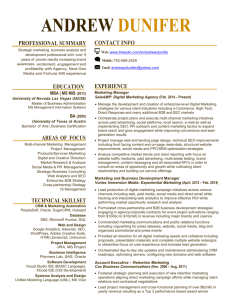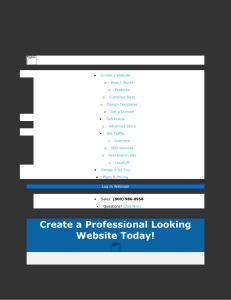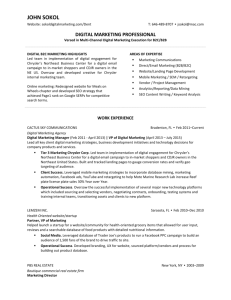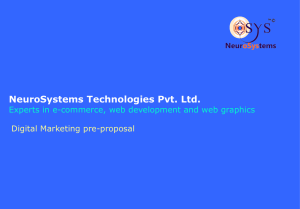benchmarking-templates-for-digital-marketing-smart-insights
advertisement
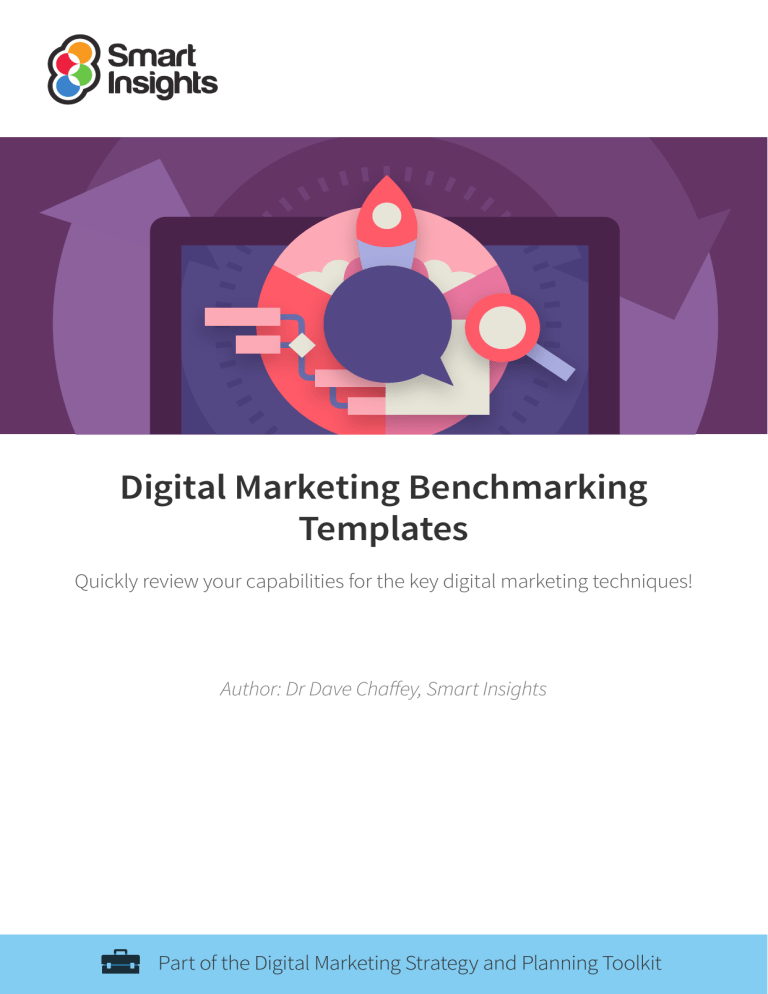
Digital Marketing Benchmarking Templates Quickly review your capabilities for the key digital marketing techniques! Author: Dr Dave Chaffey, Smart Insights Part of the Digital Marketing Strategy and Planning Toolkit Contents Introduction Transform your digital marketing to Digital Marketing excellence RACE planning lifecycle benchmarking Actionable Analytics Campaign planning process Email marketing and marketing automation excellence Digital customer experience excellence SEO capability Social media governance Influencer relationship management International marketing and localisation E-commerce marketing Marketing agency services Digital Marketing Capability Review Templates © Smart Insights (Marketing Intelligence) Limited. Please go to www.smartinsights.com to feedback or access our other guides. 2 Introduction Benchmarking templates for improving your digital marketing Kickstart your Digital Transformation with our benchmarks Whatever the size of your business or clients, ‘How do we compare to our competitors?’ is a common question when companies are looking to get more from their digital marketing. Great question! But how do you know which capabilities to compare and how can you structure your review and recommendations of actions to improve results? These templates edited by Dr Dave Chaffey and our Expert commentators will help you: þþ Review how well you are currently using the key digital marketing techniques þþ Identify the gap with where you need to be to compete þþ Create a prioritised plan of how you need to improve How do I use the capability reviews? Our benchmark templates use the recognized 5 point scale of the Carnegie Mellon capability maturity model which rates different processes from an unmanaged approach as you start out at Level 1 up to a well-managed process at Level 5. Score your business from Level 1 to Level 5 for the different ‘best practice’ activities you are using for each of the core processes we have identified as each row. What next? 3 Ac ti 1 SMART objectives Activities to optimize Defined deliverables 2 Strateg y Alternatively, take our detailed Digital marketing health check audit for premium members – this gives an Excel spreadsheet to improve your activities for each part of the RACE lifecycle. on portunity Op Once you have defined the priorities for improvement, you can then put in place an action plan to go to the next level. You may need new resources, but with our do-it-yourself 7 Steps guides and templates for core techniques like SEO, Social Media and Email marketing you can learn and apply the best practices. If you’re feeling like you’re way behind don’t despair! Digital moves fast and our research shows many are at an Levels 1 to 3. All the best for getting to the next level! Digital Marketing Capability Review Templates © Smart Insights (Marketing Intelligence) Limited. Please go to www.smartinsights.com to feedback or access our other guides. 3 TWO. Managed Take your digital marketing to the next level with our capability assessment. Use our visual checklist to audit how well your business or clients are exploiting their digital marketing and then plan how to take it to the next level. THREE. Defined FOUR. Quantified FIVE. Optimised Digital Capability ONE. Initial A. Strategic Approach No strategy B. Performance Improvement Process No KPIs Volume-based KPIs No dashboards Quality-based KPIs ‘Last click’ attribution Business dashboards Value-based KPIs Weighted attribution Ad hoc tests / CRO Lifetime-value KPIs Structured experiment programme C. Management Buy-in Limited Verbal support, but inadequate resourcing Sponsorship and increased investment Active championing and approriate investment Integral part of strategy development D. Resourcing and Structure No specific skills Core skills centralised or agencies Centralised hub and spoke Dedicated resources Decentralisation and reskilling Balanced blend of marketing skills E. Data, Martech and Infrastructure Limited / no customer database Separate data, tools and IT services Partial integrated Martech stack and data quality controls Integrated systems and 360o view data sources in Martech stack Latest innovations, e.g. AI and machine learning can be integrated F. Integrated Customer Communications Not integrated Core push activities synchronised Integrated inbound approach. Last-click evaluation. Integrated, Personalised, Paid-Owned-Earned media attribution Media optimised for ROI and to maximise CLV G. Integrated Customer Experience Static brochureware website Desktop and mobile support, not personalized. Landing pages in place. Partially personalized desktop and mobile experience Integrated, Personalized web, mobile, email and social media Full contexual personalized experiences and recommendations “Laggard” “Developing capability” “Competent average capability” “Above-sector average capability” “Market leading capability” Outline plan with prioritised marketing activities Defined vision and strategy Business-aligned strategy and roadmap Agile strategic approach Executive summary Digital Marketing Capability Review Templates © Smart Insights (Marketing Intelligence) Limited. Please go to www.smartinsights.com to feedback or access our other guides. AIMING FOR DIGITAL MARKETING EXCELLENCE 4 Refine your Digital Marketing Strategy with Smart Insights member toolkits. Check out our hub page http://bit.ly/smartstrategy for our free blog articles and planning template. Join our premium members to download digital marketing planning templates and our 7 Step guides to digital strategy. AIMING FOR INTEGRATED LIFECYCLE MARKETING #DIGITALBENCHMARKING 1. Initial 2. Managed Take your digital marketing to the next level with our capability assessment based on our RACE Planning framework. Use our visual checklist to audit how well your business or clients are exploiting their digital channels to identify and prioritise techniques to improve. 3. Defined 4. Quantified 5. Optimised Digital transformation implemented. Structured testing and optimisation programme. Plan Creating a strategic roadmap No strategy. Unclear goals or prioritisation. Pritoritised activities. Goals not modelled or aligned. Martech adoption ad-hoc. Multichannel marketing plan in place. Revenuebased funnel acquisition model. Reach Build awareness Drive visits Limited ad hoc use of paid media. No outreach. SEO not proactive. Search target keywords defined. Simple use of AdWords/online media. Structured approach to paid, owned and earned media to agreed targets. Programmatic. Regular improvements to media. New media review ad hoc. Media fully optimised based on attribution and evaluation of new options. InterAct Experience, flow and content No insight on personas and customer journeys. No content strategy. Some hero content and CTAs for lead generation and profiling Content marketing and personalised journeys to encourage leads/sales. Personalisation optimised. Ad hoc AB testing of site sections. Multivariate testing. High quality content marketing. Structured testing. Convert Build multichannel sales No paid retargeting. No email welcome or nurture. Initial media retargeting. Targeted newsletter. Simple welcome emails. Re-targeting optimised Welcome and abandon emails. Personalisation. Segmented lifecycle emails, personalisation & paid media retargeting . Retargeting and personalisation optimised across touchpoints. Engage Customer loyalty and retention Limited experience research. Email newsletter and social media. No loyalty programme Targeted newsletter. No personalisation Customer research informs site improvement. E-mail re-engagement Loyalty programme. NPS. RFM-based email and personalisation Retargeting and personalisation optimised. Machine Learning applied. Brand Building emotional connection Basic brand identity, but brand benefits not communicated. Brand values defined, but not clear on-site. Customer reviews. Online value prop defined Blog and social media develop brand. Brand personality and defects researched and acted on promptly. Fully integrated brand reputation management including PR. Governance Managing growth approach Analytics in place, not reviewed. No social media governance. Skills gap. Analytics reviewed ad-hoc Regular performance reviews. Social listening. Dashboard performance reviews. Social governance. Digital Skills. Value-based KPIs 90-day planning review. Skills improvement. Lifetime value KPIs Structured defect reduction problem “Basic Lifecycle Marketing” “Improving Lifecycle marketing” “Planned Lifecycle marketing” “Managed Lifecycle marketing“ “Optimised Lifecycle marketing” Take your digital marketing to the next level with Smart Insights premium resources Check out our Lifecycle Marketing Toolkit page for our advanced resources available to Business-level members Retention and LTV model. 90 day planning. Martech roadmap and structured evaluation. Subscribe to our business-level membership to download planning templates and best practice guides to improve lifecycle AIMING FOR DIGITAL ANALYTICS EXCELLENCE #DigitalBenchmarking 1. Initial 2. Managed Adopt actionable analytics to take your data-driven digital marketing to the next level with our capability assessment. Use our visual checklist to audit how well your business or clients are using analytics to review and improve results 3. Defined HiPPO engaged Simple reporting Wider use in business Dedicated analysts (larger businesses) 4. Quantified Dedicated experience and media optimisation resources to implement 5. Optimised Cross-business integration and collaboration A. Management and Resourcing No engagement No dedicated resource B. Metrics Selection None selected Marketing outcomes Last click Satisfaction scoring Financial value or proxy Simple media attribution Customer Lifetime value Media attribution models KPI dependencies C. Tools (Typical types) Basic web analytics Basic Social media Basic Email reporting + Customer-feedback + Basic social analytics + Benchmarking tools + Voice of customer + Personalisation + BI visualisation +Real-time social media + Offline report + CRM/Individual tracking + Predictive analytics + Econometric models (large businesses) D. Analytics Customisation ‘Out-of-box’ standard reports Goals Custom reports Mailed reports Segmentation, Events Simple threshhold alerts RACE Dashboards Fulll dashboards Automated real-time alerts E. Data Integration None Campaign source codes defined, e.g. for Email and social media integration Rules-based personalization system Marketing Automation AI / Machine learning personalization. 360 degree customer view Data Lakes or Data warehouse data storage and analysis F. Optimisation None / HiPPO-led Persona consideration Simple in-page and visitor path analysis Ad hoc AB Tests Media testing Structured AB testing programme. Optimisation of Personalisation. Multivariate testing G. Review Process No structured reviews and WILFING Regular (weekly, monthly) 90-day planning defining programme of testing Continuous programme Increase in number of tests of new techniques “Directionless” “Reporting” “Structured testing” “Customer-centric“ “Optimising” Check our blog for lots of examples of how to Plan, Manage and Optimize your digital marketing Visit our hub page www.smartinsights.com/ actionableanalytics for our free blog articles, fast start checklist. Join our premium members to learn how to achieve more actionable analytics by improving KPIs, people, process and tools using our templates and guided learning AIMING FOR CAMPAIGN PLANNING EXCELLENCE #DIGITALBENCHMARKING 1. Initial 2. Managed Idea of overall response No other success criteria Basic analytics tracking Take your campaign planning to the next level with our capability assessment. Use our visual checklist to audit how well your business or clients are planning and executing campaigns to improve their effectiveness. 3. Defined 4. Quantified Clear success criteria: Response volume, CPA and ROI Full use of analytics campaign tracking Specific objectives per channel Lifetime value assessed in time 5. Optimised Specific objectives modelled per media platform A. Campaign goals and tracking General goals No SMART objectives No analytics tracking B. Campaign insights and targeting Limited research Poorly-defined audience Top-level demographics used for targeting Audience characteristics and motivation considered in targeting Detailed targeting New options included within targeting: 70:20:10 rule C. Campaign theme and offers Known core offer, but secondary offer and messaging not known Clear primary and secondary offers Online brand benefits Audience journeys, Keywords and competitors reviewed Offer testing during campaign, Real-time marketing response Offer testing before and during campaign Real-time marketing D. REACH: Media plan and budget Campaign response not modelled. Poor integration. Top-level media budget created Detailed channel budget for campaigns Attribution considered during budgeting Custom attribution models used. New media options tested. E. ACT: Audience interaction and participation Limited use of Landing Pages or interaction. No Editorial plan. Limited core content assets to support campaign. Top level plan. Audience journeys and range of content assets considered Detailed editorial plan. Outreach built-in to content campaign Testing of new interactive content assets F. CONVERT: Optimise and test Limited campaign retargeting follow-up or Sales optimisation Simple retargeting, e.g. in Google Display Network More advanced retargeting, e.g. Google RLSA Full retargeting through social networks and Email Retargeting optimised Offline contact prioritised based on lead-scoring G. ENGAGE: Sharing and review Social sharing and campaign review not considered Sharing facilitated through sharing buttons only Social proof Post-campaign review Attribution reviewed post campaign. Lifetime value assessed in time. Detailed campaign review “Unplanned campaigns” “Starting to plan” “Integrated campaign plans” “Integrated plans with real-time response“ “Coninuous optimisation of campaigns and media” Take your campaign planning to the next level with Smart Insights member resources. Check out our hub page http://bit.ly/smartrace for our templated download. Join our premium members to download planning templates and our 7 Step guides to Campaign Planning. AIMING FOR EMAIL AND MARKETING AUTOMATION EXCELLENCE #DigitalBenchmarking Optimised Quantified Defined Managed Initial Take your Email marketing to the next level with our capability assessment. Use our visual checklist to audit how well your business or clients are exploiting their email marketing and then plan how to take it to the next level. “Starting to automate” “Targeted emailing” “Pray and spray” Regular report of opens/ clicks “Starting to integrate” “Integrated lifecycle targeting” ‘Beyond the click’ tracking of marketing outcomes Segment tracking Value reporting Hurdle rates and activity engagement levels Response data > CRM system/warehouse Email capabilities and evaluation Simple response tracking List quality Not managed List-building options increased Privacy law compliance List quality improved Reactivation and removal Preference centres Targeting (relevance) None: ‘Pray and Spray’ Demographics Basic triggers Full lifecycle sequences Lead scoring and grading Additional sequences added Proposition and communications strategy Newsletter and Eblasts Increased frequency Marketing Automation, e.g. Welcome email More automations, e.g. nurture Full lifecycle automation, e.g. Reactivation emails Optimised automations and frequency Creative and templates Simple headers Multiple templates Dynamic content insertion Video review Mobile optimised Advanced real-time content, e.g. weather, location Delivery Not reviewed Reported Reported by ESP Feedback loops and delivery service Continuous monitoring Optimisation None Experiments with different offers/subjects Structured offer/subject testing Layout reviews AB testing Multivariate testing Use of AI and Machine Learning Take your Email marketing to the next level with Smart Insights member resources. Check out our hub page http://bit.ly/smarteremail for our free blog articles, fast start checklist. Join our premium members to download email marketing planning templates and our 7 Step guides to email marketing. ONLINE CUSTOMER EXPERIENCE EXCELLENCE REVIEW 1. Initial 2. Managed Improve your online customer experience by using our visual checklist to review your capabilities for management, evaluation and personalisation. 3. Defined Defined individual responsible 4. Quantified Dedicated team (larger organisation) 5. Optimised Clear responsibilities in each area of business A. Responsibility No defined responsibility Ad hoc - cross-functional responsibility B. Evaluation and KPIs Volume of interactions Quality of interactions and short-term engagement Value of interactions Simple satisfaction assessment Long-term value Long-term engagement (Hurdle rates) Detailed understanding of Loyalty and satisfaction drivers C. Journey Analysis Techniques Limited understanding of journeys Path analysis in analytics Simple funnels Visitor intent surveys Usability studies Cross-channel analysis e.g. panels D. CRO Process No optimisation Ad hoc changes “Suck-it-and-see” Ad hoc tests Simple AB test on key pages Multivariate testing Continuous structured testing programme E. Personalisation Techniques None Specific content for Personas Limited dynamic personalisation Cross-journey personalisation Optimising personalisation F. Integration Website not integrated with other channels Simple cross-channel signposts and offers Mobile support Remarketing (paid media) Full range of crosschannel services Optimised multichannel integration G. Tools Web Analytics (not customised) Simple analytics customisation. Surveys. Personalisation Advanced Personalisation Real-time feedback tools “Hope for the best” “Taking control” “Pulling all main levers” “Long-term perspective“ “State-of-the-art” Improve your ROI from Online marketing with Smart Insights member resources. Check out our hub page http://bit.ly/smartexperience for our free blog articles and Ecommerce “Bible”. Join our Expert members to download best practice advice and templates on improving Ecommerce Marketing. SEO CAPABILITY REVIEW #DIGITALBENCHMARKING 1. Initial 2. Managed Take your SEO to the next level with our capability assessment. Use our visual checklist to audit how well your business or clients’ are exploiting their SEO to identify and prioritise areas to improve. 3. Defined Keyword gap analysis. SMART objectives and KPIs. Segments in Analytics. 4. Quantified 5. Optimised Integrated responsibilities and teams in larger organisation. SEO activities prioritised. Skills and capacity to respond immediately to most issues. A. Targets, Audit and Resourcing No proactive use of SEO. No dedicated resources for SEO. Target keyword lists. Basic audit completed. Dedicated SEO resource Top-level goals to improve. B. Indexing and Crawling Not audited and no exclusions. Duplicate content likely. Using Google Search Console (GSC) to monitor. Some exclusions set up. Mobile optimised. Using Geo-targeting, Schema markup as relevant. Site section/content specific reporting and improvements. Site section/content specific reporting and optimisations. C. On-page Optimization Not proactive. Usually an afterthought Page Titles, headings and copies used to support SEO. Page Titles, headings and copy engineered to support SEO. Structured testing of Title/ Description/Keyword Use. Continuous optimization of key content types. D. Content Marketing No content marketing strategy. Cornerstone or Skyscraper content created to support SEO Content types and formats selected for SEO (and marketing goals). Integrated Content/PR and SEO campaigns. Use of community and UGC supports growth. E. Link building No record of external links. Links mainly organic, plus from some partners. Link re-configuration as need. More use of outreach. Backlink profile reviewed for balance. Disavowing. Structured outreach programme linked to campaigns. Consistent quality of content limits need for outreach. F. Internal Linking Not assessed. Some use of internal links to support SEO. Navigation designed to support SEO. Some testing of internal link methods along with usability. Internal linking optimised. G. Measurement and reporting Top-level target keywords defined. Contribution of SEO known and tracked through time at top level. Segments to assess value (VQVC). GSC APIs. Detailed keyword/content Good knowledge or performance across site. Keyword Deltas monitored Capacity to immediately identify problems compared to competitors. “Not Proactive” “Reviewing effectiveness” “Applying best practices” “Improving“ “Best-in-class” Take your SEO to the next level with Smart Insights member resources. Check out our hub page http://bit.ly/smarterseo for our free blog articles and Fast Start checklist. Join our premium members to download search planning templates and our 7 Step guide to SEO. AIMING FOR SOCIAL MEDIA EXCELLENCE Take your Social Media Marketing to the next level with our capability assessment. Use our visual checklist to audit your business or clients’ use of Social Media Marketing and then create an action plan with our social media resources. Optimised #DIGITALBENCHMARKING Quantified Defined Managed Initial “Using Social” 1. Goals and Channel Integration No goals beyond ‘doing social media’. 2. Social Listening and Governance “Starting to integrate” “Starting to Plan” “Fully-integrated Social strategy” ROI reviewed. Goals agreed throughout the business Social a key part of integrated multi-channel strategy General goals defined. Social buttons on website. SMART objectives defined Social media integrated into website. Automated Email integration. Attribution using analytics. Social integrated into offline campaigns. No Social Media Monitoring Monitoring of brand mentions. Reputation Management Defined process for customers reporting issues via social Proactive PR - Influencer outreach Social Media care Proactive outreach to customers. Inputting into New Product Dvlpt. 3. Content Planning No planned content creation. Page updates only - not linking to hub. Social hub/blog with content being created and shared in social updates Monthly content plan with key content thems and engaging assets. Longer-term 90 day content plan with themes for different audiences. 90 day content plan with themes which are announced and integrated. 4. Interaction and community management Limited, reactive interaction on social media. Monitoring and replying to comments. Proactive interaction with fans, influencers company pages. Social care. Community management resource for facilitating discussions. Localised. Team in place for personalised replies and to facilitate discussion 24/7. 5. Company Page Optimisation Pages set up, but not well branded. Branded pages on priority social channels (e.g. Twitter, Facebook) Branded pages set up on common and newer social channels (e.g. Pinterest) Branded pages set up on channels requiring nontext content e.g. YouTube Additional page features such as integrated videos and apps utilised. 6. Paid advertising Not using paid advertising. Experimenting with promoting updates without targeting Targeted ads to boost page fans, site visits or leads Remarketing for leads or sales. Power Editor in Facebook. Optimised investment based on attribution and ROI review. 7. Evaluation Not analysing page statistics. Recording basic stats of growth (e.g. Page Followers, Likes). Benchmarking reach, interaction rates. Tracking site outcomes. Using analytics tools to evaluate behaviour of audience. Attribution. Integrated dashboard of Social media performance and alerts on key issues. “Starting out with Social” Take your Social Media marketing to the next level with Smart Insights member resources. Check out our hub page http://www.smartinsights. com/social-media-marketing/ and our free blog articles, and Fast Start checklist. Join our Expert members to download Social Media marketing planning templates and social network guides. INFLUENCER RELATIONSHIP MANAGEMENT EXCELLENCE #DIGITALBENCHMARKING 1. Initial 2. Managed Ad hoc activity Repeatable process ‘Insufficient’ resource Take your IRM to the next level with our capability assessment. Use our visual checklist to audit how well your business or clients are exploiting their influencer outreach to identify and prioritise areas to improve. 3. Defined Good campaign-based process ‘Sufficient’ resource 4. Quantified Good continuous ‘alwayson’ and campaign processes 5. Optimised Optimisation based on annual and end of campaign reviews A. Audit IRM process Limited activity No process B. Set goals No targets Targets for number of influencers Detailed funnel targets and performance review Influencer activity targets by segment Influencer pogramme ROI targets C. Select technology No tools Spreadsheets Dedicated influencer outreach and tracking tools Process for using tools effectively Process for optimizing using tools D. Segment influencers Market influencers not known Influencers better known, not categorised Influencers categorised and prioritised Appropriate tactics suitable to types of influencers Programme for refreshing influencers as needed. E. Content strategy No / unsuitable assets No hub No strategy Basic assets Ad hoc blogging Campaign plans Some quality assets Influencer-generated Basic strategy and plan F. Manage outreach No process Organic sharing Limited influencer involvement with content No paid deals Mainly content-based outreac Paid deals More continuous outreach Fully-managed process including crisis management G. Evaluate and measure ROI No measurement Basic tracking of total visits Influence on leads and sales known from URL PDF and social tracking Impact of influencers and ROI known Comparison to competitor programmes known “Limited outreach” “Ad hoc outreach” “Structured IRM programme” “Optimizing IRM programme“ “Optimized IRM programme” Take your IRM to the next level with Smart Insights premium member resources. Check out our influencer outreach guides and editorial calendars to improve your approach More segmented content Full 12 month plans Refined strategy process Join our premium members to download our templates and guides to campaign and content marketing strategy. Digital Marketing Capability Review Templates © Smart Insights (Marketing Intelligence) Limited. Please go to www.smartinsights.com to feedback or access our other guides. INTERNATIONAL LOCALISATION BEST PRACTICES Take your International Marketing to the next level with our capability assessment. Use our visual checklist to audit your business or clients’ use of Localisation for International Marketing #DIGITALBENCHMARKING Quantified Managed Optimised “Fully-localised” Defined “Starting to optimise” IT/marketing/sales department integration & collaboration Region-specific crossbusiness & crossdisciplinary integration and collaboration “Localisation managed” Initial “Starting to localise” No defined roles or responsibilities Ad-hoc responsibility for international websites Defined roles and responsibilities for each region but online activity siloed 2. Strategy and planning No localisation strategy or plan Single localisation strategy for all territories Separate localisation strategy for each territory Data-driven localisation strategy with clearly defined SMART objectives Regular situation review + agile strategic approach to localisation 3. Infrastructure and data Single language site hosted in home territory Separate multi-language websites hosted in target regions with ccTLD or Defined approach to infrastructure in different regions Infrastructure decided on a case-by-case basis to support users in target Optimised infrastructure – CDNs, page speed analysis & optimisation 4. Content No local content created Content created is not well tailored to local market needs Content is ‘culturally customised’ to local needs Additional static content developed to increase local relevance All forms of content such as interactive tools and video are localised where effective 5. International search marketing No search marketing strategy / SEO limited to on page content in source language Source keywords identified and translated for target language Localised keyword research, target keywords & onsite optimisation Structured on page TDK testing, tracking across languages and territories Dedicated outreach programmes, PR, content marketing on local sites 6. Customer experience Limited customer support and little understanding of customer journey Basic understanding of the customer journey but no action taken Site structure and content optimised for customer journey – but not localised Usability studies for localised user journeys, key markets optimised Fully personalised for user preferences in each territory 7. Analytics, optimisation and reporting Analytics installed but not customised for lcoal reporting or KPIs Reporting based on traffic volumes, measurement of traffic per territory Simple page, visitor path analysis and AB tests of content per territory Localised dashboards per region, multi-variate testing & segment/region Dynamic optimisation of personalised content and competitor benchmarking “Limited localisation” 1. Roles and responsibilities 13 Take your International marketing to the next level with Smart Insights member resources Check out our hub page http://www.smartinsights. com/international-marketing/ and our free blog articles Join our premium members to download Digital Transformation templates and guides AIMING FOR E-COMMERCE MARKETING EXCELLENCE Take your E-commerce marketing to the next level with our capability assessment. Use our visual checklist to audit how well your business or clients are exploiting their digital channels to identify and prioritise areas to improve. #DIGITALBENCHMARKING 1. Initial 2. Managed 3. Defined 4. Quantified Multichannel marketing plan in place. Profit-based funnel acquisition model. Retention and LTV model. 90 day planning. Martech roadmap and structured evaluation 5. Optimised Digital transformation implemented. Structured testing and optimisation programme. Plan Creating a strategic roadmap No strategy. Unclear goals. Pritoritised activities. Sales goals, not modelled. Martech adoption ad-hoc. Reach Build awareness Drive visits Limited ad hoc use of paid media. SEO not proactive. Search target keywords defined. Simple use of AdWords/online media. Structured approach to paid, owned and earned media to agreed targets. Programmatic. Regular improvements to media. New media review ad hoc. Media fully optimised based on attribution and evaluation of new options. Interact Experience, flow and content No insight on customer journeys. Limited insight on product popularity Footfall to different site sections and product categories understood. Content marketing and merchandised journeys to encourage purchase. Merchandising optimised AB testing of different site sections. Multivariate testing. High quality content marketing. Convert Build multichannel sales No paid remarketing. Simple broadcast newsletter. Initial media retargeting. Targeted newsletter. Simple welcome emails. Re-targeting optimised Welcome and abandon emails. Personalisation. Segmented lifecycle emails, personalisation & paid media retargeting. Retargeting and personalisation optimised across touchpoints. AI. Engage Customer loyalty and retention Limited experience research Customer newsletter No loyalty programme Targeted newsletter. No personalisation Customer research informs site improvement email re-engagement Loyalty programme. NPS. RFM-based email and personalisation Retargeting and personalisation optimised across touchpoints. AI. Brand Building emotional connection Basic brand identity, but brand benefits not communicated. Brand values defined, but not clear on-site. Customer reviews. Online value prop defined Blog and social media develop brand. Brand personality and defects researched and acted on promptly. Fully integrated brand reputation management including PR. Governance Managing growth approach Analytics in place, not reviewed. Ad hoc trading reviews Analytics reviewed ad-hoc Regular trading reviews. Value-based KPIs 90-day planning review. Lifetime value KPIs Structured defect reduction problem “Basic E-commerce Marketing” “Improving E-commerce marketing” “Managed E-commerce marketing“ “Optimised E-commerce marketing” Take your E-commerce marketing to the next level with Smart Insights member resources Dashboards for regular weekly trading reviews. “Planned E-commerce marketing” Check out our E-commerce Toolkit page for our free E-commerce mistakes checklist Join our premium members to download planning templates and best practice guides to improve retail E-commerce TRANSFORMING MARKETING AGENCY SERVICES #DIGITALBENCHMARKING 1. Initial 2. Managed Services based on own skills, experience and client and market drivers Take your agency to the next level with our capability assessment. Use our visual checklist to audit how well your agency is running its new business and account growth to identify and prioritise areas to improve. 3. Defined Defined service propositions communicated to market 4. Quantified Services roadmap aligned to business growth plan 5. Optimised Agile approach: modified as market / tech develops A. Digital services offered Not offered or sporadic, reactive B. Value Proposition Not considered Understood but not well articulated with proof Clearly defined with supporting statements Quant and qual results, case studies, testimonials and agency registers Ongoing evidence based case studies, attracting desirable new business C. Existing client growth Not considered Some of team: ad hoc approaches to clients Agency-wide account growth planning Tracking of account targets by service type Scheduled client feedback, Net Promoter, ongoing proactive D. New Business Framework No roadmap or methodology Audit of past wins and profitable business Clear new business strategy, defined tasks and roles Opportunities assessed on merit, agreed investment level per opportunity Planned pipeline, defined team, plan refined based on learnings re wins/loses E. Pricing & Estimating No pricing or estimating model Benchmarking the market, analyse historic cost v revenue per team Estimating framework used, rate card/s defined Estimate vs actual effort / cost tracked for profitability Value vs time and rates model assessed per engagement, rates flexed F. Process & workflow No defined digital marketing processes in place Some documentation but not across all services Clear process flow, document suite, roles defined Workflow platform used across agency MI. and profitability reporting across client, project G. Teams / resources No digital strategy or delivery capability in house Potential partners audited, in-house talent assessed for training needs Team roles defined, partner contracts in place, talent recruitment plan Ongoing talent acquisition, development plans for staff Attracting award-winning talent, strong industry profiles “Laggard” “Developing capability” “Competent average capability” “Above average capability“ “Market-leading capability” Take your Agency Management to the next level with Smart Insights member resources. Check out our toolkit page http://go.smartinsights. com/agency for our free blog articles, fast start checklist. Join our Business members to download agency planning templates and explore other agency resources.
